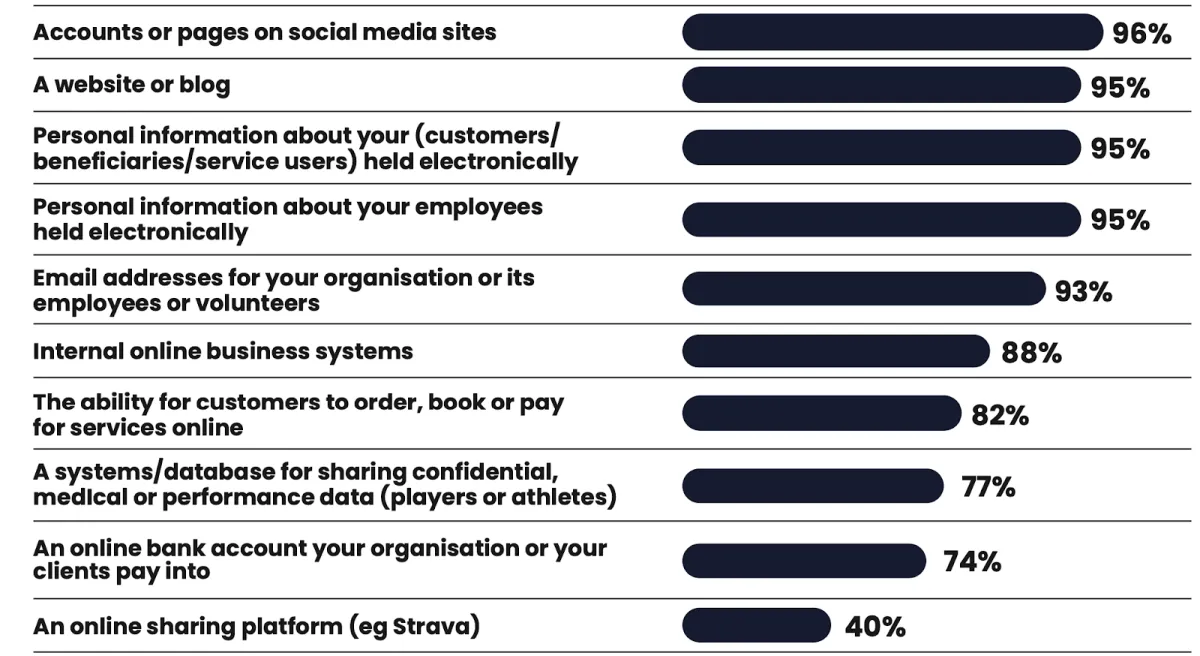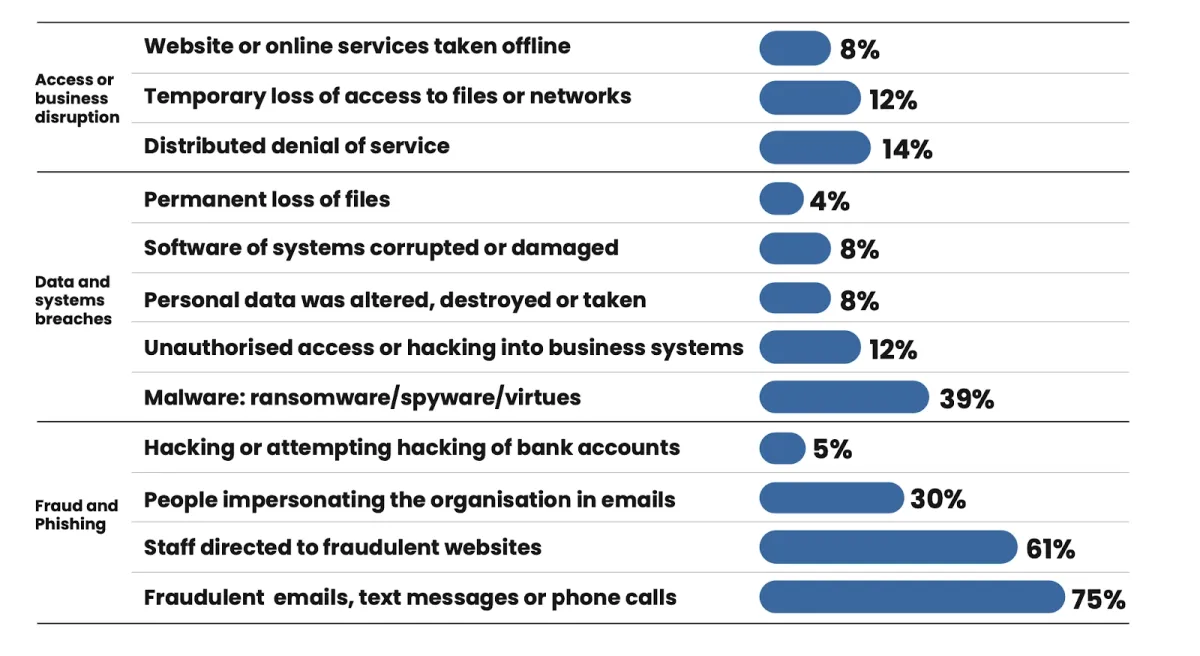At least 70% of sports organizations have experienced cyber incidents or breaches.1 With cybercriminals targeting:
- athlete data
- fan data
- reputation
- infrastructure that powers sports organizations
We explore the unique cybersecurity risks facing the sports industry and examine the strategies sports organizations can employ to protect themselves and their stakeholders from cyber threats.
Why do we need cybersecurity in sports?
According to a report, nearly all sports organizations have websites, social media accounts, and digital files collecting the personal data of customers, employees, and volunteers. According to National Cybersecurity Centre, more than 80% of respondents have online business systems that provide clients the option to book, pay for, or make purchases online (see Figure 1). 2 Cybersecurity should be seen as crucial, considering the prevalence of technology in sports.

Source: National Cyber Security Centre3
Figure 1: Which of the following, if any, does your organization currently have or use?
1- Protection of sensitive data
Sports organizations collect and store sensitive data, including athlete and fan data, financial data, and intellectual property. Cybersecurity is essential to protect this data from unauthorized access, theft, or manipulation by cyber criminals.
Athlete and fan data, including health information, payment details, and location data, is often stored across connected systems. To secure this information, some teams implement network segmentation strategies that isolate critical infrastructure from public-facing services.
2- Reputation management
A cyber attack on a sports organization can cause significant reputational damage, leading to financial losses and loss of fan trust. Cybersecurity measures can help prevent such incidents and mitigate their impact if they do occur.
Fans expect their personal data to be protected and their interactions with sports organizations to be secure. Sports organizations can build and maintain fan trust by prioritizing cybersecurity and increasing engagement and revenue. This is also crucial for reputation management.
For event security and access control, computer vision security solutions are being used to monitor stadium entrances, detect suspicious behavior, and automate identity verification—all of which reduce the chance of physical and cyber threats converging.
3- Operational continuity
A cyber attack on a sports organization’s infrastructure can disrupt operations and lead to significant financial losses. By implementing cybersecurity measures, sports organizations can ensure their operations’ continuity, minimize downtime risk, and increase revenue. 4
4- Compliance with regulations
Sports organizations are subject to various data privacy and security regulations (such as GDPR). By implementing cybersecurity measures, sports organizations can ensure compliance with these regulations and avoid penalties or legal issues.
Top 5 Cybersecurity use cases in sports
1-Protecting athlete data
Athlete data, such as medical records and performance statistics, are valuable information that can be targeted by cybercriminals. For example, in 2016, the World Anti-Doping Agency (WADA) was hacked, and sensitive athlete data was leaked.5 The incident resulted in public embarrassment for the athletes and the organization. The attack on WADA is described as a “spearphishing” attack.6
Sports organizations must ensure that athlete data is properly secured and access is strictly controlled to prevent similar incidents. Education on phishing attempts is a good choice of defense against this form of cyberattack. Preventing these assaults may be accomplished by being aware of the appearance of phishing emails.
2-Securing online ticket sales
Online ticket sales are a common target for cybercriminals. Hackers can use phishing attacks to obtain credit card information or use bots to purchase tickets in bulk and resell them at inflated prices. Ticket fraud reports have doubled since 2022, and resell value of online tickets for almost whatever sporting event is known to fluctuate extremely.7 Some organizations turn to multi-factor authentication tools and access control platforms to ensure fans’ and staff’s digital identities are properly secured.
Sports events comprise the largest segment of worldwide event tickets, and it has a projected market volume of over $28 billion in 2023.8 Sports organizations must ensure their online ticketing systems are secure and employ two-factor authentication and fraud detection measures to prevent fraudulent purchases.
3-Preventing game-day cyber attacks
Cyber attacks during the game day can disrupt operations, cause financial loss, and potentially endanger athletes and spectators. An example of such game-day disruptions happened most recently during the 2022 World Cup semi-final match between France and Morocco. Due to in-app loading difficulties, the outage caused problems for certain FuboTV subscribers in viewing the full game. FuboTV argued that the outage was because of a cyber attack.9 Sports organizations must have contingency plans to prevent similar incidents and ensure their critical infrastructure is properly secured.
4-Securing broadcasting infrastructure
Broadcasting infrastructure is a valuable target for cybercriminals, which can disrupt live broadcasts or steal valuable intellectual property. For example, In 2015, the French broadcaster resulted in the shutdown of 12 channels and the leak of sensitive information.10 Sports organizations must ensure their broadcasting infrastructure is secure and regularly audited for vulnerabilities to prevent similar incidents.
Data collected by sports analytics platforms is also increasingly used for betting, marketing, and performance improvement. To protect that data across APIs, many IT teams include API security testing as part of their regular dev and deployment cycles.
5-Protecting fan data
Sports organizations collect fan data through online purchases, loyalty programs, and social media interactions. Fans are prone to phishing scams via mobile apps, and remotely managed systems are open to hackers. 11 Man-in-the-middle attacks are also possible on public wireless networks.
This data can be targeted by cybercriminals and used for identity theft or other malicious purposes. Sports organizations must ensure that fan data is properly secured and access is strictly controlled.
See Figure 2 for an overview of the attack trends.

Source: National Cyber Security Centre12
Figure 2: Attack Trends – Percentage of organizations reporting attack activity
Cybersecurity in global sporting events
2024 Paris Olympics
Cyberattacks became a significant concern at the 2024 Paris Olympics, with over 140 incidents reported. French authorities and the country’s cybersecurity agency, ANSSI, prepared extensively to protect critical systems, implementing secure networks and real-time monitoring. While there were 22 serious incidents targeting IT systems, none disrupted the Olympic activities. Most of these attacks were denial-of-service (DoS) attacks aimed at overwhelming servers. A ransomware attack targeted the Grand Palais Olympic venue but did not directly affect Olympic systems.
The Paris Olympics faced a wide range of cyber threats, including phishing attacks, disinformation campaigns, and ransomware, driven by various motivations such as state-sponsored espionage and financial gain. The Games’ cybersecurity infrastructure included an advanced Security Operations Center (SOC) and collaboration with partners like Cisco, ensuring the Games remained operational despite the threats.
2016 Rio De Janeiro Olympics
During the 2016 Summer Olympics in Rio de Janeiro, even before the games began, the official Olympic website and related organizations were targeted by a long-lasting Distributed Denial-of-Service (DDoS) attack. Additionally, in September, the hacking group Fancy Bear used a phishing campaign to infiltrate the World Anti-Doping Agency’s database, leaking confidential medical information about 41 athletes who competed in the Rio Olympics.
Euro 2024 Germany
Similarly, Euro 2024, held in Germany, experienced a heightened focus on cybersecurity due to similar concerns about attacks on digital infrastructure, with threats ranging from data breaches to service disruptions. Both events showcased the need for robust security measures to counter increasingly sophisticated cyber threats.
What are the cybersecurity challenges in sports?
1- Rapidly evolving threats
Cyber threats constantly evolve, making it difficult for sports organizations to keep up with the latest threats and vulnerabilities. Attackers are constantly looking for new ways to exploit system weaknesses, making it challenging for sports organizations to maintain strong cybersecurity measures.
2- Complex supply chains
Sports organizations often work with many vendors and partners, creating a complex supply chain. This can make it challenging to ensure that all parties have adequate cybersecurity measures and that there are no vulnerabilities in the supply chain.
3- Limited resources
Many sports organizations have limited resources to devote to cybersecurity, especially smaller organizations or those with limited budgets. This can make it difficult to implement and maintain strong cybersecurity measures.
4- Legacy systems
Some sports organizations may still use legacy systems not designed with modern cybersecurity practices in mind. These systems can be difficult to secure and more vulnerable to cyber-attacks.
5- Lack of awareness
Not all members of a sports organization may be aware of the importance of cybersecurity or how to practice good cyber hygiene. This can lead to human error or unintentional vulnerabilities.
6- Cultural challenges
Some sports organizations may have a culture that does not prioritize cybersecurity or may see cybersecurity as a hindrance to innovation or operations. Implementing strong cybersecurity measures or getting stakeholders’ buy-in can make it difficult.
External Links
- 1. National Cybersecurity Centre “The Cyber Threat to Sports Organisations” 2020
- 2. National Cybersecurity Centre “The Cyber Threat to Sports Organisations” 2020
- 3. National Cybersecurity Centre “The Cyber Threat to Sports Organisations” 2020
- 4. Cybersecurity impact of the growth of data in sports. SPIE
- 5. Russian hackers release secret data of 25 more Olympic athletes .
- 6. Greenwald, Max, “Cybersecurity in Sports” Questions of Privacy and Ethics, Tufts University, December 2017
- 7. Ticket fraud reports double since the start of 2022 | Cyber Magazine.
- 8. Media - Worldwide | Statista Market Forecast. Statista
- 9. FuboTV Says Cyber Attack Was Behind Major Outage During World Cup Semifinal Match. Sports Business Journal
- 10. French media groups to hold emergency meeting after Isis cyber-attack | France | The Guardian. The Guardian
- 11. The growing threat of cybersecurity attacks in sports. SPIE
- 12. National Cybersecurity Centre “The Cyber Threat to Sports Organisations” 2020

Comments
Your email address will not be published. All fields are required.